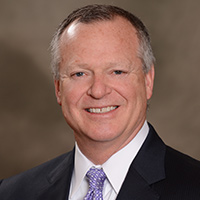Any port in a storm: How we can help each other navigate the challenging months ahead

Joseph J. Fifer
- The healthcare industry and society in general are enduring a period of pandemic fatigue marked by uncertainty over when the ongoing pandemic will actually end.
- Pandemic-related fatigue and stress manifest very differently from one person to the next, even among healthcare professionals who work in the same organization.
- Healthcare finance professionals should consider how they can support colleagues who may be struggling, starting with stopping and taking time to really listen.
Someday, if we’re lucky, we will recount stories from the pandemic year(s) to our younger colleagues or perhaps to our grandchildren. Those who work in healthcare will share tales of heroism, resourcefulness, fear, grief, loss and bravery.
My daughter, a physician assistant in a cardiothoracic intensive care unit, has shared many such stories with me already, which keeps me grounded in the true nature of the service provided by healthcare professionals.
But I suspect that when the pandemic is a distant memory, few will dwell on the phase we are in now, which is sometimes called pandemic fatigue or burnout. I feel it too — I’m tired of all the steps that are necessary to do everyday activities safely and of being unable to do so many things I like to do. I just wish this were over.
The news cycle is a roller coaster, with frequent developments related to COVID-19 variants and vaccination making it difficult to discern how the disease trendline is actually changing. We reached a high point with approval of vaccines late last year, but now reality is setting in: We can’t be certain when this will be over. We don’t even know for sure what over means.
Recognizing the full spectrum of pandemic fatigue
Last spring, a saying made the rounds on social media: “We are all in the same storm, but we are not in the same boat.” That message still resonates. Even those who work within the same hospital are not in the same boat. The pressures people face in different roles within the complex organizational structure of a hospital are vastly different. Add on various individualized stressors in our lives outside of work and it’s easy to see that people are coping with different types and levels of pandemic stress.
For physicians and other frontline healthcare workers, in particular, discouragement, stress and exhaustion are taking a toll. Some are retiring early; others are simply leaving the field. A recent New York Times article quoted a 42-year-old internist who decided to leave her practice: “Everyone says doctors are heroes and they put us on a pedestal, but we also have kids and aging parents to worry about. After a while, the emotional burden and moral injury become too much to bear.”
Caring is not limited to caregivers
So what can finance professionals do? Even though we aren’t trained counselors, keep in mind that we are all “in the same storm.” When you encounter a colleague who seems to be struggling, put your personal agenda on pause. Just stop. Then, ask your colleague an open-ended question beyond the perfunctory, “How are you?” You might even try for a little levity.
Maybe they will choose to share, maybe they won’t. If they do, listen — with empathy. You’re not expected to solve their problem. In all likelihood, you can’t. But simple active listening shows that you care. And sometimes that’s enough to make a difference.
Last summer, as I was reflecting on issues related to racial injustice, the stop/listen/care framework came to mind. It led me to write a message to the HFMA community. As I commented then, we as individuals can’t fix all that ails either society or healthcare. But that doesn’t stop us from trying to improve it. That starts with caring.
It’s the same with pandemic fatigue. We can’t cure it. But we can be supportive of each other as we each navigate these challenging times. We can, and should, care.





